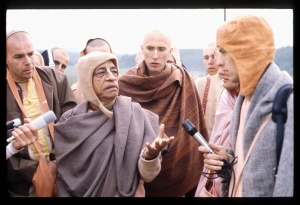SB 2.6.32: Difference between revisions
No edit summary |
(Vanibot #0054 edit - transform synonyms into clickable links, which search similar occurrences) |
||
| Line 23: | Line 23: | ||
<div class="synonyms"> | <div class="synonyms"> | ||
''sṛjāmi'' | ''[//vanipedia.org/wiki/Special:VaniSearch?s=sṛjāmi&tab=syno_o&ds=1 sṛjāmi]'' — do create; ''[//vanipedia.org/wiki/Special:VaniSearch?s=tat&tab=syno_o&ds=1 tat]'' — by His; ''[//vanipedia.org/wiki/Special:VaniSearch?s=niyuktaḥ&tab=syno_o&ds=1 niyuktaḥ]'' — appointment; ''[//vanipedia.org/wiki/Special:VaniSearch?s=aham&tab=syno_o&ds=1 aham]'' — I; ''[//vanipedia.org/wiki/Special:VaniSearch?s=haraḥ&tab=syno_o&ds=1 haraḥ]'' — Lord Śiva; ''[//vanipedia.org/wiki/Special:VaniSearch?s=harati&tab=syno_o&ds=1 harati]'' — destroys; ''[//vanipedia.org/wiki/Special:VaniSearch?s=tat&tab=syno_o&ds=1 tat]-[//vanipedia.org/wiki/Special:VaniSearch?s=vaśaḥ&tab=syno_o&ds=1 vaśaḥ]'' — under His subordination; ''[//vanipedia.org/wiki/Special:VaniSearch?s=viśvam&tab=syno_o&ds=1 viśvam]'' — the whole universe; ''[//vanipedia.org/wiki/Special:VaniSearch?s=puruṣa&tab=syno_o&ds=1 puruṣa]'' — the Personality of Godhead; ''[//vanipedia.org/wiki/Special:VaniSearch?s=rūpeṇa&tab=syno_o&ds=1 rūpeṇa]'' — by His eternal form; ''[//vanipedia.org/wiki/Special:VaniSearch?s=paripāti&tab=syno_o&ds=1 paripāti]'' — maintains; ''[//vanipedia.org/wiki/Special:VaniSearch?s=tri&tab=syno_o&ds=1 tri]-[//vanipedia.org/wiki/Special:VaniSearch?s=śakti&tab=syno_o&ds=1 śakti]-[//vanipedia.org/wiki/Special:VaniSearch?s=dhṛk&tab=syno_o&ds=1 dhṛk]'' — the controller of three energies. | ||
</div> | </div> | ||
Latest revision as of 21:18, 17 February 2024

A.C. Bhaktivedanta Swami Prabhupada
TEXT 32
- sṛjāmi tan-niyukto 'haṁ
- haro harati tad-vaśaḥ
- viśvaṁ puruṣa-rūpeṇa
- paripāti tri-śakti-dhṛk
SYNONYMS
sṛjāmi — do create; tat — by His; niyuktaḥ — appointment; aham — I; haraḥ — Lord Śiva; harati — destroys; tat-vaśaḥ — under His subordination; viśvam — the whole universe; puruṣa — the Personality of Godhead; rūpeṇa — by His eternal form; paripāti — maintains; tri-śakti-dhṛk — the controller of three energies.
TRANSLATION
By His will, I create, Lord Śiva destroys, and He Himself, in His eternal form as the Personality of Godhead, maintains everything. He is the powerful controller of these three energies.
PURPORT
The conception of one without a second is clearly confirmed here. The one is Lord Vāsudeva, and only by His different energies and expansions are different manifestations, both in the material and in the spiritual worlds, maintained. In the material world also, Lord Vāsudeva is everything, as stated in the Bhagavad-gītā (BG 7.19). Vāsudevaḥ sarvam iti: everything is Vāsudeva only. In the Vedic hymns also the same Vāsudeva is held to be supreme. It is said in the Vedas, vāsudevāt paro brahman na cānyo 'rtho 'sti tattvataḥ: in fact there is no greater truth than Vāsudeva. And Lord Kṛṣṇa affirms the same truth in the Bhagavad-gītā (BG 7.7). Mattaḥ parataraṁ nānyat: "There is nothing above Me [Lord Kṛṣṇa]." So the conception of oneness, as overly stressed by the impersonalist, is also accepted by the personalist devotee of the Lord. The difference is that the impersonalist denies personality in the ultimate issue, whereas the devotee gives more importance to the Personality of Godhead. Śrīmad-Bhāgavatam explains this truth in the verse under discussion: Lord Vāsudeva is one without a second, but because He is all-powerful, He can expand Himself as well as display His omnipotencies. The Lord is described here as omnipotent by three energies (tri-śakti-dhṛk). So primarily His three energies are internal, marginal and external. This external energy is also displayed in the three modes of goodness, passion and ignorance. Similarly, the internal potency is also displayed in three spiritual modes—saṁvit, sandhinī and hlādinī. The marginal potency, or the living entities, is also spiritual (prakṛtiṁ viddhi me parām), but the living entities are never equal to the Lord. The Lord is nirasta-sāmya-atiśaya; in other words, no one is greater than or equal to the Supreme Lord. So the living entities, including even such great personalities as Lord Brahmā and Lord Śiva, are all subordinate to the Lord. In the material world also, in His eternal form of Viṣṇu, He maintains and controls all the affairs of the demigods, including Brahmā and Śiva.